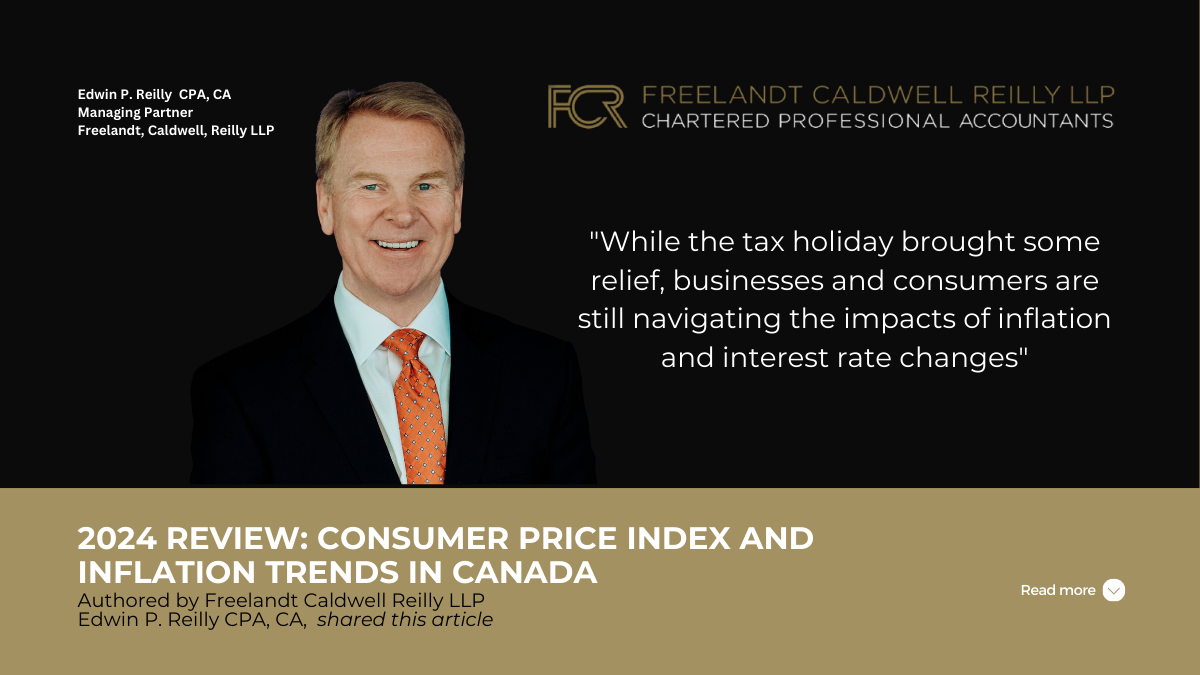ARTICLE | February 13, 2025
Introduction
The introduction of the Goods and Services Tax/Harmonized Sales Tax (GST/HST) break, which only took effect midway through December, significantly influenced these Canada’s Consumer Price Index (CPI) changes. Despite the transitory nature of the tax holiday, the full impact of this tax relief measure is expected to manifest in January. Interestingly, the data revealed the presence of disinflation even prior to the tax holiday’s initiation, indicating a wider economic trend (2).
Amidst a complex economic landscape, Canada’s Consumer Price Index (CPI) displayed a noteworthy rise of 1.8% in December, while simultaneously declining 0.4% on a month-to-month basis. This unique trend is attributed to the tax holiday implemented by the federal government and the prevailing disinflation forces within the economy (2) .
Inflation and Disinflation Trends
Despite the temporary tax holiday, disinflation remained a significant economic trend in Canada in 2024. The Bank of Canada navigated these economic waters by reducing its policy rate by 25 basis points. In turn, this action led to the weakening of the Canadian dollar (2).
Trade policy uncertainty continued to influence the inflation outlook. While price stability was restored, the potential imposition of tariffs could have an inflationary effect, potentially disrupting the progress made towards price stability (2) .
A Breakdown of the Factors Contributing to the Consumer Price Index
Food Inflation
In 2024, food inflation fell significantly to 0.6% from 2.8% in November. This decline was mostly due to the tax holiday which exempted certain items such as food, restaurant dining, and children’s clothing and footwear from GST/HST (2).
Interest Rates and Mortgage Payments
High interest rates played a critical role in driving inflation in 2024. Mortgage payments made up a significant part of the CPI. However, rate cuts in the latter half of the year helped to mitigate mortgage payments, leading to a rise of 20.1% in the mortgage interest cost index compared to 28.5% in 2023 (2).
On the other hand, the shelter component emerged as a significant factor in the CPI, rising 5.7% in 2024 compared to 5.6% in 2023, largely due to higher borrowing rates (1). Rent prices rose by 8.2% in 2023 due to higher demand caused by population growth from immigration and people choosing to rent instead of buying because of high borrowing rates and the influx in condominiums across major cities in Canada (2) . These rates began to decrease in 2024, driving demand for sales and easing demand for rentals (2).
Transportation Prices
In 2024, prices of transportation rose at a faster rate in 2024, by 1.6%, compared to 2023 at 0.9% (2), as gasoline prices fell more slowly and insurance premiums and registration fees both went up (2). Gasoline prices fell to a lesser extent in 2024 (-0.2%) compared to 2023 (-7.6%) due to a base-year effect, stemming from geopolitical tension and uncertainty surrounding global production and consumption (2).
Conclusion
Ultimately, the trends of the Consumer Price Index in Canada in 2024 showed a decline in annual averages, persistent disinflation, and significant influences from the tax holiday, interest rates, and mortgage payments. The Bank of Canada’s strategies and the impact of trade policy uncertainty continue to shape the inflation outlook for the country.
Read more of RSM Canada’s insights on inflation, the economy and the middle market.
Read more of Statistics Canada’s Insights on the Customer Price Index 2024 Annual Review.
References:
(1) Government of Canada, Statistics Canada. (2025, January 21). The Daily — Consumer Price Index: Annual review, 2024. https://www150.statcan.gc.ca/n1/daily-quotidien/250121/dq250121b-eng.htm
(2) Nguyen, T. (2025, January 21). Consumer price index rises by 1.8% as tax holiday takes hold. The Real Economy Blog. https://realeconomy.rsmus.com/canadas-consumer-price-index-december

Let’s Talk!
Call us at 1 855 363 3526 or fill out the form below and we’ll contact you to discuss your specific situation.

